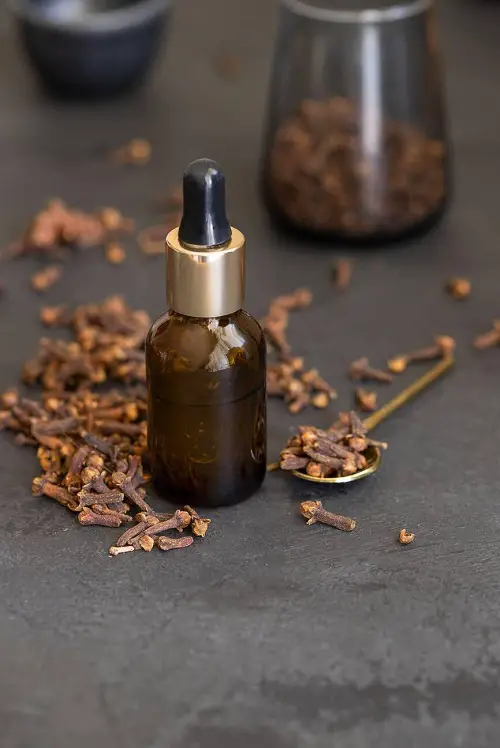From boosting oral health to treating infections, clove oil benefits are endless! Let’s explore them gradually!

Also known by its Latin name Eugenia Caryophyllata, clove oil is extracted from the buds and leaves of the clove tree. Native to Indonesia, the clove tree has been in use in Chinese medical practices for quite a long to treat low-level health problems. But besides, there are several more amazing benefits of clove oil, which you can learn below!
Benefits of Clove Oil
1) Can Boost the Immune System
A 2005 study suggests that clove essential oil is quite effective against candida infections. In another 2012 study, it was found that clove essential oil also helped fight off staph infections. Clove oil contains a compound called eugenol that has been proven to boost your body’s immune system, which also helps fight off several symptoms of flu and colds.
2) Eases Toothache
Traditional Chinese medicinal properties document the use of clove oil to help with toothaches and prevent dental erosion. If you apply clove oil to a sore tooth, you can experience soothing numbness of the surrounding nerves for upto 3 hours. A study in 2006 compared this numbing effect of clove oil to a commercial dental numbing agent named benzocaine. The study concluded that the oil was just as effective as clove oil.
Another study researched the effects of clove oil on eroded teeth caused by acidic beverages such as sodas and juices. It found that clove oil’s molecules were effective in reducing erosion, thus also reducing cavities.
A 2016 study also found that clove oil was quite effective at stopping the growth of cavity-causing organisms.
Note: Never apply clove oil directly to your gums, as it is a potent essential oil. You must consult a medical professional before using clove oil to relieve toothaches.
3) Improves Gut Health
From the mouth to the gut, clove oil has several amazing benefits. But the best part is that if you’re suffering from digestive issues like bloating, stomach pain, flatulence, and even motion sickness, you can apply clove bud oil topically to your abdomen.
But that’s not all! A study in 2018 found that clove oil could help prevent the formation of ulcers in the GI tract by helping boost the production of gastric mucus, which in turn helped protect the digestive tract lining.
4) Has Anti-Inflammatory and Anti-Microbial Properties
Clove oil is a great preventive measure for a wide range of skin conditions and fungal infections thanks to its anti-inflammatory properties and antifungal and antibacterial properties.
While most antibiotics can’t penetrate the biofilm of bacteria (a community of biofilm living together protected by a slimy film), a study of 2012 suggested that clove oil could kill staph bacteria biofilm and in liquid culture.
In an earlier study in 2005, researchers attributed clove oil’s ability to prevent yeast infections in vitro to the presence of the compound eugenol. Later, in 2018, research also suggested clove oil could help prevent bacterial infections like influenza and pneumonia. Plus, it has antimicrobial properties to help you deal with your skin issues like fungal infections caused by environmental fungi. Always use clove oil for topical application only after diluting it with carrier oil.
5) Has Anti-Cancer Properties
An in-vitro study conducted in 2014 showed the effectiveness of clove oils against cancer cells when used in certain quantities. In another study conducted in the same year, researchers showed that clove oil stopped the growth of several cancer cell lines, including breast, colon, and cervical cancer. The oil disrupted cell division while increasing cell death in the colon cancer cell line.
6) Can Boost Heart Health and Lower Blood Pressure
The main compound in clove oil, eugenol, was said to be a therapeutical remedy for hypertension in a 2015 study. In vitro studies found clove oil’s effectiveness in boosting cell blood sugar intake and insulin secretion in human muscle cells, helping them produce insulin.
7) Could Promote Liver Health
Several animal studies found that the eugenol compound in clove oil helped improve liver health and could be beneficial in reversing signs of liver scarring and liver cirrhosis. Some studies are still conducted to understand the effect of clove oil and eugenol on the human liver.
8) May Help Strengthen Bone Health
There are 200 million people who suffer from osteoporosis and even millions more who also have a low bone mass condition, which can lead to more serious conditions. While the effects of clove oil on human bones are still limited, some animal studies suggest clove oil’s ability to preserve bone mass.
A 2011 study found that clove extracts high in eugenol improved several high markers of osteoporosis while also boosting bone strength and density.
9) Supports Mental Health
In the points above, you may have already gathered how clove oil can have various physical benefits, but did you know it can support your mental health, too? Besides aromatherapy, topical application can also help you absorb the oil’s fragrance, thus helping you relax and cope with anxious times and stress. This is also why clove oil is a popular ingredient in potpourri, soaps, and candle recipes when diluted.
You can also add the diluted oil to a warm bath or massage it onto your skin, thus helping your body relax.
10) Helps Improve Dry Skin
A study in 2017 suggests that clove oil can help reduce chronic itching and skin irritation. Many people use clove oil as a natural therapeutic remedy to reduce the appearance of puffy skin, tired eyes, and stretch marks.
A 2007 study noted that within three months of using a cream containing clove oil, 60% of the participants were recovering from anal fissures compared to 12% of participants who used lignocaine and stool softeners.
11) Alleviates Respiratory Problems
Last but not least, clove oil can be a great remedy for respiratory disorders like cough, cold, asthma, sinusitis, tuberculosis, bronchitis, or sore throat. Thanks to its anti-inflammatory and cooling properties, clove oil can help clear nasal passages and reduce respiratory congestion.




